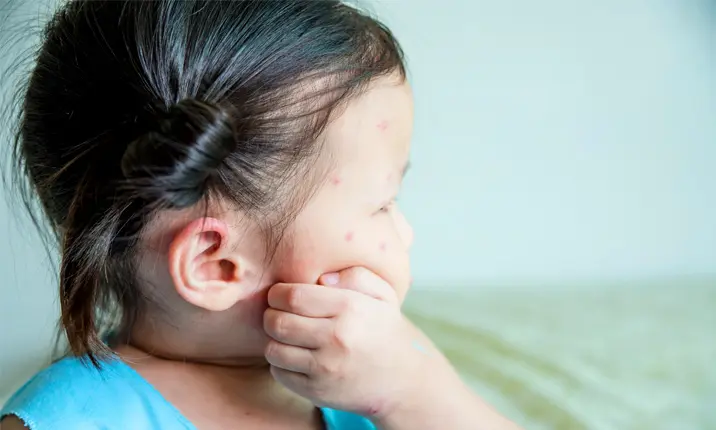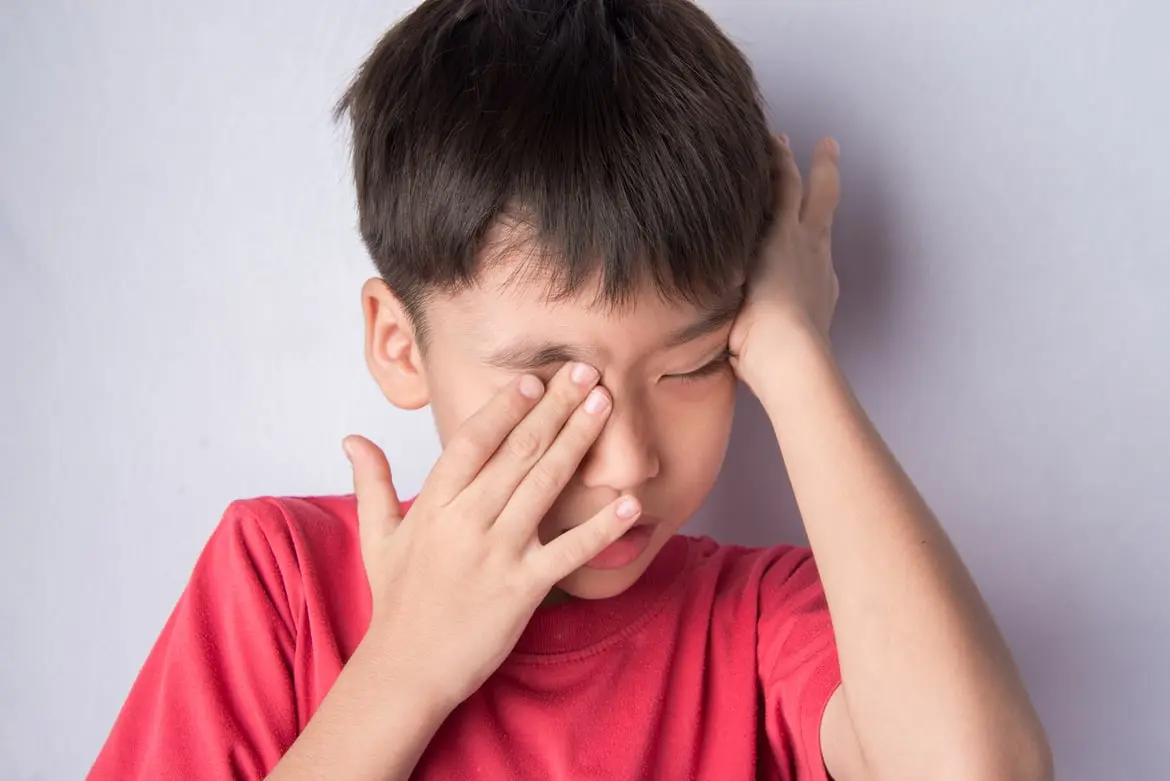

Source: Getty Images
Keeping Your Child Safe from Mpox: A Parent’s Guide
Last updated: Tuesday, September 10, 2024 | 8 min reading time
As the mpox situation evolves globally, Dr Alison Snodgrass shares how mpox affects children and what parents can do to keep them safe.
The World Health Organization (WHO) declared mpox a global health emergency for the second time on August 14, 2024. This decision was driven by a surge in the cases from the more transmissible and severe Clade (variant) Ib, in contrast to Clade II, which was responsible for the 2022 to 2023 outbreak.
Children appear to be bearing the brunt of this latest outbreak, as seen in the Democratic Republic of Congo (DRC) — the epicentre of the current outbreak, where they currently make up over half of the cases there.
Although Singapore has not reported Clade I cases, our global connectivity does increase the risk of exposure. This may raise concerns among parents about how mpox could affect their children and what they can do to keep them safe. Dr Alison Snodgrass, paediatrician at Parkway East Hospital, addresses these critical questions below.
1. What is mpox?
Mpox is an illness caused by infection with the monkeypox virus (MPXV). The monkeypox virus is a member of the Orthopoxvirus genus that also includes the smallpox (variola), cowpox and vaccinia viruses. The virus has two variants or genetic subtypes known as Clade I (sub-clades Ia and Ib) and Clade II (with sub-clades IIa and IIb), which are endemic in the Congo basin in central and west Africa respectively.
Clade I, which has been observed to be more transmissible and to cause more severe infections than Clade II, is driving the current outbreak. Initially detected in the Democratic Republic of Congo (DRC), this variant has since spread to neighbouring countries, and more recently in August, cases have been reported in Sweden and Thailand.
2. Why is the current outbreak of mpox affecting children?
Clade I is spreading more easily through close, prolonged contact compared to Clade II, which primarily spread through sexual contact during the previous outbreak. This new mode of transmission is one of the reasons why children are particularly vulnerable.
In the DRC, overcrowding, malnutrition, lack of access to healthcare and less developed immunity given their young age are other reasons why children are among the hardest hit.
Since the beginning of the year, approximately 8,772 children in the DRC have contracted the disease, representing over half of the country's 15,664 total reported cases. Of the 548 reported deaths, around 463 have been children.
It is uncertain whether Singapore will experience an outbreak of this scale, since outcomes might be different outside of Africa. Still, children’s tendency to engage in close-contact activities and their less developed immune systems make them more susceptible to severe health outcomes from mpox.
Besides children, pregnant women and immunocompromised individuals are also at higher risk of severe illness from mpox.
3. How does mpox spread to children?
Mpox can spread to children or adults through the various modes of transmission below, whether caused by Clade I or Clade II.
Transmission from infected individuals
Mpox can spread through close or prolonged physical contact with an infected individual. Physical contact can include face-to-face, skin-to-skin (such as with an infected individual’s skin lesions, scabs or rashes) and sexual contact.
Contact with an infected individual’s body fluids or exposure to their respiratory secretions or saliva can also result in transmission, especially being within 2 metres of the infected person when they cough or sneeze.
Rarely, vertical transmission can occur from infected mothers to their unborn children.
Transmission from infected animals
Mpox can also spread through direct contact with the blood, body fluids, or skin and mucosal lesions of infected animals. Bites or scratches from these animals can also result in transmission.
Transmission from bushmeat preparation
Bushmeat preparation has also been linked to human cases of mpox. Other food has not been associated with human cases of mpox, and there is no current evidence suggesting that food or food packaging is a likely source of transmission.
Transmission through contaminated materials and the environment
Mpox can also spread through contaminated materials and environments, such as objects, fabrics, and surfaces that have not been disinfected after use by someone with mpox. This includes items like clothing, bedding and towels.
How the virus enters the body
The virus enters the body through broken skin (even if it is not visibly broken), the respiratory tract, or mucous membranes, such as through the eyes, nose, mouth or anogenital area.
4. What are the symptoms of mpox in children? How do these symptoms compare to those in adults?
Symptoms can appear 5 – 21 days after exposure (typically 6 – 16 days).
They can last for 2 – 4 weeks, and for those with weakened immune systems, they may last longer than this period.
Common symptoms include:
- Rash on the hands, feet, chest, face, mouth, or near the genitals
- Fever
- Chills
- Swollen lymph nodes
- Fatigue
- Myalgia (muscle aches and backache)
- Headache
- Respiratory symptoms like sore throat, nasal congestion, and cough
Mpox symptoms are similar in both adults and children.
5. What are the early symptoms of mpox in children and adults?
Early symptoms include fever, headache, muscle ache, backache, the swelling of lymph nodes and a general feeling of exhaustion.
6. What should I do if I suspect my child has mpox?
If you notice any symptoms of mpox, have your child wear a mask, cover any skin lesions with a clean sheet or gown and see a general practitioner (GP) or paediatrician promptly for diagnosis.
7. How is mpox diagnosed?
Diagnosis typically involves swabbing a rash or skin lesion sample for a polymerase chain reaction (PCR) test to detect viral DNA. If no skin lesions are present, samples may be taken from the throat or anus. Blood tests are generally not used for diagnosing mpox.
8. Are there any complications or long-term impacts of mpox in children?
Complications of mpox infection include secondary bacterial infection, inflammation of the heart muscle (myocarditis), brain (encephalitis) or anus (proctitis), pneumonia, and conditions related to the eyes.
9. How is mpox treated in children?
Treatment for children is like that for adults, focusing on managing mpox symptoms such as fever, pain, and itching with medication and rest.
During the infectious period (usually from symptom onset until all lesions have healed), children should remain at home in a well-ventilated room to prevent the spread of the virus. They should also wear a mask, wash their hands frequently, and avoid popping blisters or itching rashes to prevent further spread. Epsom salt baths and saltwater rinses can help soothe sores.
For severe infections, antiviral medications like tecovirimat and cidofovir may be used. Vaccinia immune globulin may also be used in some cases.
For any further advice personalised to your child’s condition, speak to a GP or paediatrician.
10. Is there a vaccine available to protect children against mpox?
Currently, the mpox vaccine available in Singapore is MVA-BN (JYNNEOS), a third-generation smallpox vaccine available for use in adults. There is another live-attenuated vaccine, LC16, for use in children and adults in Japan, but this is not available in Singapore at this time.
11. How can I protect my child from mpox, even while traveling?
Parents can assist their children in observing these guidelines:
- Always observe and practise good personal hygiene.
- Wash your hands regularly with soap, especially before handling food or eating, after going to the toilet, or when hands are dirty from coughing or sneezing. If water is not available, use an alcohol-based hand sanitiser that contains at least 60% alcohol.
- Avoid contact with persons who are unwell (e.g. those with rash or other lesions).
- Avoid sharing common items that may be contaminated with bodily fluids.
- Swimming may be allowed in well-maintained and adequately chlorinated pools.
When travelling, avoid feeding or touching animals, especially stray or wild animals, and the consumption of bush meat.
Travellers from countries affected by mpox should monitor for symptoms for 21 days upon their return from these countries. Please refer to the Health Advisory for Travellers from the Ministry of Health for precautionary measures to be taken when travelling.
Mask wearing is not recommended currently, since mpox is not spread primarily through respiratory modes, but through close physical contact.
If your child is unwell or develops symptoms such as sudden high fever, swollen lymph nodes and rash, seek medical attention immediately. During your child's visit to the doctor, ensure to inform him or her about your family's travel or exposure history.
Stay informed to protect your young ones
Unlike COVID-19, mpox is not as infectious, which makes the risk of transmission relatively lower. Still, early detection and containment are crucial to manage the spread of the virus.
In Singapore, enhanced border screening measures have been in place to help prevent mpox from entering the community. The Ministry of Health is also keeping a close watch on the risk mpox has on children.
On an individual level, you can do your part to keep your young ones and yourself safe by staying informed and following preventive measures.
If you suspect your child may have mpox or need further guidance, consult your paediatrician or GP promptly.
Curious to learn more about mpox? Read more here.
BBC News. (2024, August 26). The children bearing the brunt of the mpox outbreak. Retrieved August 5, 2024, from https://www.bbc.com/news/articles/cdjwz77mmgmo
Business Times. (2024, August 21). No need to rush for masks: Mpox is not the new COVID-19, experts. Retrieved August 5, 2024, from https://www.businesstimes.com.sg/singapore/no-need-rush-masks-mpox-not-new-covid-19-experts
NBC News. (2024, August 17). The mpox strain spreading now is different from the one in 2022: Here's what to know. Retrieved August 5, 2024, from https://www.nbcnews.com/health/health-news/mpox-virus-outbreak-symptoms-2024-spread-rcna166778
UNICEF. (2024, August 28). Mpox and children. Retrieved August 5, 2024, from https://www.unicef.org/stories/mpox-and-children
World Health Organization. (2024, August 26). Mpox. Retrieved August 5, 2024, from https://www.who.int/news-room/fact-sheets/detail/mpox
UNICEF Press Release: UNICEF. (2024, August 16). Children at significant risk from surging mpox outbreak in the Democratic Republic of the Congo. Retrieved August 5, 2024, from https://www.unicef.org/press-releases/children-significant-risk-surging-mpox-outbreak-democratic-republic-congo-unicef
Straits Times (2024, August 21). Global mpox emergency: Will Singapore be badly affected? Retrieved August 5, 2024, from https://www.straitstimes.com/singapore/global-mpox-emergency-will-singapore-be-badly-affected
Ministry of Health Singapore. (2024, August 26). Mpox. Retrieved August 5, 2024, from https://www.moh.gov.sg/diseases-updates/mpox
Ministry of Health Singapore. (2024, September 4). Update on public health preparedness measures for mpox clade I. https://www.moh.gov.sg/news-highlights/details/update-on-public-health-preparedness-measures-for-mpox-clade-i
Business Times. (2024, August 21). No need to rush for masks: Mpox is not the new COVID-19, experts. Retrieved August 5, 2024, from https://www.businesstimes.com.sg/singapore/no-need-rush-masks-mpox-not-new-covid-19-experts
NBC News. (2024, August 17). The mpox strain spreading now is different from the one in 2022: Here's what to know. Retrieved August 5, 2024, from https://www.nbcnews.com/health/health-news/mpox-virus-outbreak-symptoms-2024-spread-rcna166778
UNICEF. (2024, August 28). Mpox and children. Retrieved August 5, 2024, from https://www.unicef.org/stories/mpox-and-children
World Health Organization. (2024, August 26). Mpox. Retrieved August 5, 2024, from https://www.who.int/news-room/fact-sheets/detail/mpox
UNICEF Press Release: UNICEF. (2024, August 16). Children at significant risk from surging mpox outbreak in the Democratic Republic of the Congo. Retrieved August 5, 2024, from https://www.unicef.org/press-releases/children-significant-risk-surging-mpox-outbreak-democratic-republic-congo-unicef
Straits Times (2024, August 21). Global mpox emergency: Will Singapore be badly affected? Retrieved August 5, 2024, from https://www.straitstimes.com/singapore/global-mpox-emergency-will-singapore-be-badly-affected
Ministry of Health Singapore. (2024, August 26). Mpox. Retrieved August 5, 2024, from https://www.moh.gov.sg/diseases-updates/mpox
Ministry of Health Singapore. (2024, September 4). Update on public health preparedness measures for mpox clade I. https://www.moh.gov.sg/news-highlights/details/update-on-public-health-preparedness-measures-for-mpox-clade-i
 Brain & Spine Care
Brain & Spine Care














